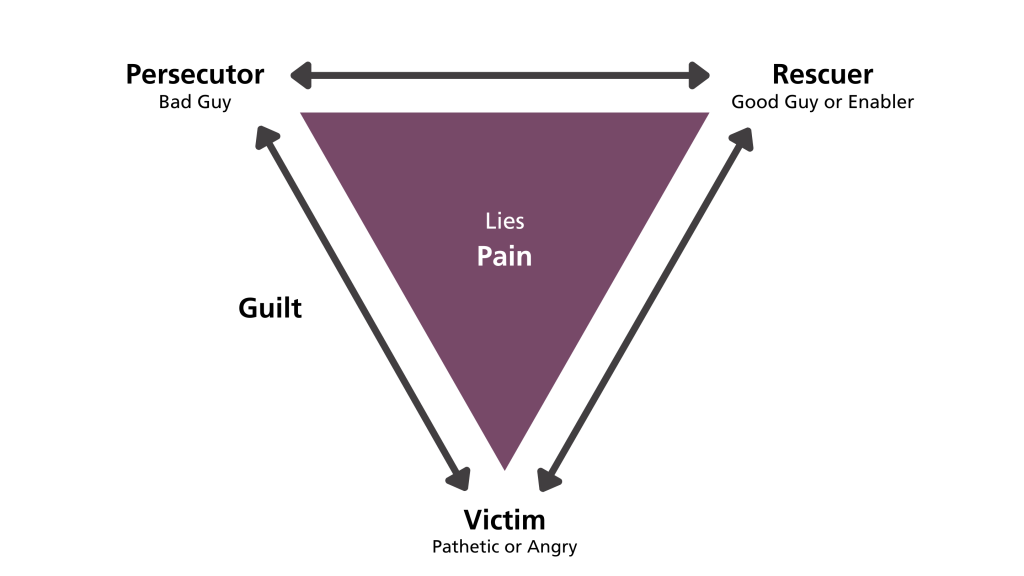
It starts the same way every time.
One small argument… a missed call… a subtle change in tone.
Before you know it, you’re not talking about dinner plans anymore — you’re trapped in a whirlwind of blame, rescue missions, and hurt feelings.
You don’t even remember how you got here.
But you do know the cycle: one of you feels helpless, the other swoops in to “fix” it, and somehow, that same “hero” ends up being the bad guy by the end of the night.
Sound familiar?
If it does, you might be caught in the Karpman Drama Triangle — and you’re not alone.
The Karpman Drama Triangle: Why We Keep Playing the Same Roles

First described by psychologist Stephen Karpman, the Drama Triangle is a psychological model that explains why some relationships get stuck in an exhausting loop.
There are three main roles:
The Victim (or Damsel in Distress) – Feels powerless, overwhelmed, or in need of rescue. Often says things like “Why does this always happen to me?” or “I can’t cope — please tell me what to do.”
The Persecutor (or Villain) – Blames, criticizes, or controls the Victim. You’ll hear: “It’s all your fault” or “See what you made me do.”
The Rescuer (or False Hero) – Rushes in to “help” — sometimes without being asked — and feels guilty if they don’t. They’ll say: “Let me help you” or “I’ll sort this out, you’re not capable of doing it on your own.”
The twist?
We don’t stick to just one role. We switch. Constantly.
A Rescuer who “helps” without consent may be seen as controlling — suddenly becoming the Persecutor.
A Victim who uses guilt to get attention can become the Persecutor too.
And a Persecutor, feeling misunderstood, might flip into the Victim role.
It’s this role-switching that fuels the drama.
Why the Karpman Drama Triangle Feels So Familiar (and So Draining)
If you’ve been in a relationship where the same fights keep looping, the Karpman Drama Triangle is often hiding underneath.
It gives everyone a strange kind of comfort — because each role meets a hidden emotional need:
-
The Victim gets care and attention.
-
The Rescuer feels needed and important.
-
The Persecutor feels powerful and in control.
But this comfort is short-lived. Over time, it creates:
-
Emotional exhaustion (especially for Rescuers)
-
Resentment (for everyone involved)
-
Stagnation (because nothing really changes)
Breaking Free: Shifting from Drama to Empowerment
The good news?
You can step out of the triangle — but it takes awareness and a willingness to give up your favorite role.
Victim → Creator
Instead of waiting to be saved, take small, actionable steps toward solving your problem. Ask: What’s one thing I can do right now to improve this?
Rescuer → Coach
Support without taking over. Believe the other person is capable. Replace “I’ll fix it for you” with “What do you think your next step could be?”
Persecutor → Challenger
Challenge without shaming. Hold people accountable in a way that encourages growth, not fear.
Why This Matters More Than You Think
Escaping the Karpman Drama Triangle isn’t just about improving your relationship — it’s about reclaiming your personal power.
When you step out of these roles, you stop living reactively.
You stop playing out old scripts.
You start building something healthy, balanced, and real.
And maybe, for the first time in a long time…
You finally feel free.
If you’ve recognized yourself or your partner in this story, it’s not a sign of failure — it’s a sign you’re ready for change.
At Naked Recovery, we help people break free from destructive relationship patterns and build healthier ways of connecting.
You don’t have to keep playing the same role forever.
Ready to explore a healthier way forward? Book a Clarity Call with us and let’s talk about what’s been showing up in your relationship — and what could change. Together, we’ll explore options and see if one of our coaching programs is the right next step for you.

